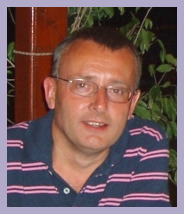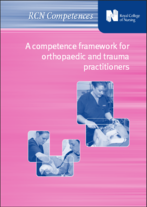 by Dr Brian Lucas, Chair Royal College of Nursing‘s Society of Orthopaedic and Trauma Nursing (SOTN), Lead Nurse Education and Development The Queen Elizabeth Hospital King’s Lynn NHS Trust
by Dr Brian Lucas, Chair Royal College of Nursing‘s Society of Orthopaedic and Trauma Nursing (SOTN), Lead Nurse Education and Development The Queen Elizabeth Hospital King’s Lynn NHS Trust
The Royal College of Nursing (RCN)’s Society of Orthopaedic and Trauma Nursing (SOTN) is a professional forum with approximately 3,000 nurses who work in diverse roles within primary and secondary care. This diversity can be a strength, but it can also be a weakness: we are everywhere but spread thinly in places, so sometimes it is difficult to get our voice heard.
Being heard depends on us being clear about what is the essence of orthopaedic and trauma nursing, and therefore what is unique about what we can offer patients, carers and fellow professionals. Our competence framework, published in 2012, was our attempt to articulate this. Three of the four core domains of practice relate to orthopaedic-specific nursing skills – Comfort Enhancer (pain and discomfort management such as positioning of limbs), Risk Manager (reducing the potential risks of treatment such as deep vein thrombosis) and Technician (such as application of traction or plaster casts). These are all competencies where it is relatively easy to demonstrate that they are not skills routinely used by other nurses and thus are specialist orthopaedic and trauma nursing skills.
The fourth appears at first glance to be more generic. It is ‘Partner/Guide,’ which is defined as ‘Supporting the patient and ensuring they are at the centre of their care is essential. In addition, working in partnership with the patient’s family/informal carers is vital, as is liaison and collaboration with all members of the multi-professional team (MPT) to ensure seamless holistic care.’ This fits well with current thinking, namely NHS England’s work on person centred co-ordinated care for long term conditions as outlined at ARMA’s 2015 AGM by Jacquie White.
 But what does this mean SOTN members might be contributing to MSK care? In a previous role as an Orthopaedic Advanced Practice Nurse, I was involved in the care of patients with chronic hip and knee pain from assessment to long term recovery after hip or knee replacement. I would see patients referred by their GP and after assessment decide with them the best course of treatment depending on their individual circumstances – for some it would be joint replacement, for others it would be conservative management. For those having surgery I would be involved in their preparation through information sessions, I would see them on the ward after their operation and then again in outpatients to monitor their recovery – for up to 5 years post-surgery. I was therefore able to build up a relationship with them and also co-ordinate their care, with access to other professions such as orthopaedic surgeons when required. For me not only was it a very satisfying job but I felt I was fulfilling the requirements of all four core domains of practice – and that I could only be an effective ‘Partner/Guide’ because I had the skills and knowledge from the other three domains.
But what does this mean SOTN members might be contributing to MSK care? In a previous role as an Orthopaedic Advanced Practice Nurse, I was involved in the care of patients with chronic hip and knee pain from assessment to long term recovery after hip or knee replacement. I would see patients referred by their GP and after assessment decide with them the best course of treatment depending on their individual circumstances – for some it would be joint replacement, for others it would be conservative management. For those having surgery I would be involved in their preparation through information sessions, I would see them on the ward after their operation and then again in outpatients to monitor their recovery – for up to 5 years post-surgery. I was therefore able to build up a relationship with them and also co-ordinate their care, with access to other professions such as orthopaedic surgeons when required. For me not only was it a very satisfying job but I felt I was fulfilling the requirements of all four core domains of practice – and that I could only be an effective ‘Partner/Guide’ because I had the skills and knowledge from the other three domains.
My role was not unique within orthopaedic nursing and many others do similar roles, like those in partnership with patients who have chronic back pain, osteoporosis or undergoing surgery. Nurses are traditionally the co-ordinators of care and often the only health professionals who are available for patients/carers 24 hours a day. We therefore bring particular strengths and skills to the table with regard to ARMA’s work, in particular the Clinical Networks project. Equally, we benefit from our membership; for example, orthopaedic and trauma nursing has often developed new roles and then struggled to identify suitable training and supervision for newly acquired skills, which is one of the strands of the Clinical Networks projects. So as I step down from the national committee of SOTN in December, after nine years as committee member and four as Chair, I think we are in a good position as a Society to work as part of ARMA to really take forward MSK care.

